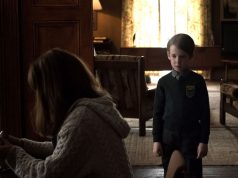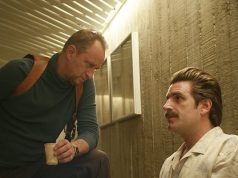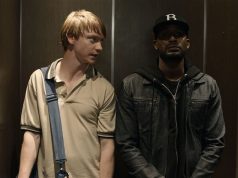The Internet Movie Database reports that “Travellers & Magicians” is the first feature film ever made in Dzongkha, a language spoken by some 160,000 people in the Himalayan nation of Bhutan. It is also one of very few movies to be shot in the pristine, unspoiled beauty of that region. Little wonder this area was the inspiration for Shangri-La in “Paradise Lost.”
But Dondup (Tsewang Dandup) doesn’t consider it paradise. Having recently moved to a remote village from the big city and taken a government job, he finds he is bored and unsatisfied there. He smokes cigarettes and listens to Western rock ‘n’ roll and anxiously awaits word from his friend who has already moved to America. When the letter finally comes, Dondup leaves the village for Thinphu, and from there he will proceed to the United States. Why, you can do anything you want there, and make more money at it!
He misses the one bus that passes the outskirts of the village and must wait for another ride. Hitchhiking appears to be an acceptable means of transportation, as there is also an elderly apple salesman (Ap Dochu) and a Buddhist monk (Sonam Kinga) waiting alongside him. They are bemused by Dondup’s disdain for village life and by his fervent, outspoken desire to find something better in the West.
The wise monk tells him a story, which we see in enacted in the imagination of the film. It’s about a young man named Tashi (Lhakpa Dorji) who has been sent to magic school but who finds it boring and unfulfilling. He, too, wants to flee his small village and seek his fortune. He wanders into the woods and finds an isolated house where an old man and his beautiful young wife Deki (Deki Yangzom) live. Slightly injured, Tashi remains with them for a few days to recuperate, the few days turning into weeks as he becomes smitten with Deki. He no longer just wants a better life than his small village can provide; he wants HER.
Writer/director Khyentse Norbu, whose first effort was the cute but unmemorable “The Cup,” shows promise with his sophomore effort. The natural beauty of Bhutan is spotlighted constantly, and if all of it feels necessarily “foreign” to a Western viewer, the story-within-a-story is downright otherworldly, shot with partial color and bleary, dreamlike cinematography.
In the end we are warned against the dangers of dissatisfaction, of the falsehood that the grass is greener on the other side. The parallel stories are simple, the destinations are unimportant, the acting is un-showy, but the movie has a certain power to it. Like “The Cup,” it will probably not be long remembered, but it charms and entertains in the moment, at least.
B- (1 hr., 48 min.; in Dzongkha with subtitles; )





